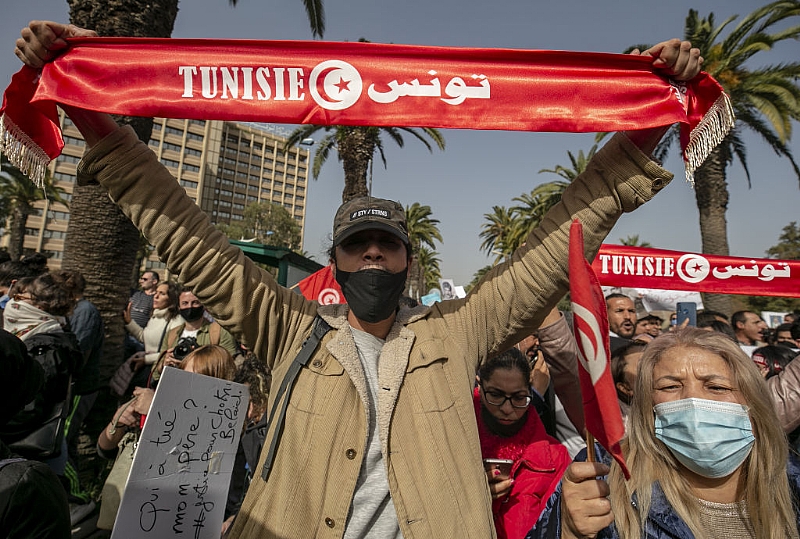
[ad_1]
It has been 10 years since national protests in Tunisia led to the ousting of Tunisian President Zine El Abidine Ben Ali and his regime. Ben Ali ruled Tunisia for 23 years. Tunisia’s “Revolution of Dignity” marked the first time that a long-standing Arab autocrat has been deposed by a mass uprising.
The protests were motivated by unemployment, food inflation, corruption, lack of political freedom and poor living conditions in the country.
But too little has changed. Protests continued to escalate after the state of emergency was imposed in 2015, allegedly in response to escalating terrorism. This year, just days before the 10th anniversary of the Dignity Revolution, the government suddenly announced a lockdown and curfew. Undeterred, people protested again and continue to do so.
Research on Tunisia’s power transition and the country’s post-uprising trajectory shows that the grievances behind the recent protests are the same as those that led to the Revolution.
Then as now, people protested for their socio-economic rights and to achieve a measure of social justice, as well as to make their political voice heard. Successive governments have stepped up repression of civil and political rights. And corruption – which exploits ordinary people but benefits the rich and influential – remains rampant. Rather than pursuing the “goals of the revolution”, the government has rediscovered bad old habits, ignoring or delegitimizing dissent.
Our research also revealed that the deterioration of economic conditions and the increase in inequalities were not consequences of the Revolution but were produced by austerity measures. These were introduced by the government at the request of the European Union and international financial institutions.
The roots of disaffection
Thanks to our research, we have seen that Tunisians want a social democracy that ensures both socio-economic and civil and political rights. For Tunisians, social justice and socio-economic rights are an integral part of democracy and cannot be treated as mere results.
In the interviews we heard how people are expressing their frustration at never having met the 2011 requirements. And call for “another real revolution”.
Public opinion polls since 2011 consistently show that Tunisians want a responsive government. They want it to provide decent public services and economic security, an end to corruption, democratic government, and social and political rights.
Instead – according to the Arab Barometer, a central resource for quantitative research on the Middle East – two-thirds of Tunisians think politicians don’t care about people’s needs. Trust in politicians, political parties or the government is extremely low. And less than 10% are happy with the government as a whole. Most of them are dissatisfied with the government’s job creation record, its performance in reducing inequalities and fighting inflation.
In addition, around 90% believe that the government is corrupt, that wasta is necessary to find a job, and that government officials provide wasta to help their loved ones.
Signed, sealed, but not delivered
Economic grievances drove the Dignity Revolution and have been a problem ever since. The government has failed to deliver economic growth, debt reduction, trade or jobs. Unemployment remains high, the transition from school to work is increasingly difficult and jobs have become more precarious.
On top of that, in its latest economic assessment, the World Bank highlighted a lack of investment, low private sector productivity and lower exports than the pre-revolution period.
The government is not solely responsible for the failure to implement deep socio-economic reform. Our research suggests that international financial institutions and Western governments are also complicit. They encouraged – sometimes pushed – Tunisia to adopt neoliberal economic policies in exchange for aid and trade. For example, structural reforms of public institutions and public enterprises, reduction of energy subsidies and devaluation of the Tunisian dinar in accordance with the market-based exchange rate.
These policies reduce public spending, which means the government cannot improve social services or income support.
“ Proven and Failed ” Policies
Whatever policymakers think they are doing, it hasn’t worked. It did not dampen popular discontent either. The Tunisian government, the EU and international financial institutions need to rethink “tried and failed” policies. They must adopt measures that meet people’s demands for dignity, employment and the fight against corruption.
The government could, for example, invest in infrastructure – especially in the interior – to create jobs and attract foreign and local investment. A progressive tax structure would redistribute wealth, increase internal demand, and send people a symbolically important signal. As is the protection of the unemployed and a concerted fight against corruption.
For its part, the European Union could allow Tunisia better access to its domestic agricultural market, where Tunisian production has a competitive advantage. They could also ease loan repayment terms or even pressure work to be more – not less – more profitable and safer.
This explains why the transition is considered a failure. And why, as they did 10 years ago, Tunisians are calling for “isqaat an-nizaam“: The end not only of the rule of one autocrat in particular, but of an entire system.
Andrea Teti has received funding from the Seventh Framework Program of the European Union under grant agreement no. 320214.
Pamela Abbott received EU funding for the research on which this article is based.
Saerom Han does not work, consult, own stock or receive funding from any company or organization that would benefit from this article, and did not disclose any relevant affiliation beyond his academic appointment.
By Saerom Han, Honorary Fellow, University of Aberdeen and
Andrea Teti, Senior Lecturer in International Relations, University of Aberdeen and
Pamela Abbott, Director of the Center for Global Development and Professor in the School of Education, University of Aberdeen![]()
Source link